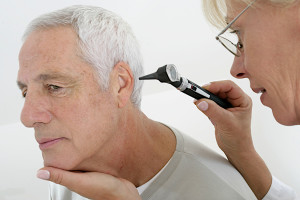Written by Greg Arnold, DC, CSCS. A 2016 study analyzing the data on 303,339 subjects, found that iron deficiency anemia increased the odds of developing sensorineural hearing loss by 82% and combined hearing loss by 141% but had no effect on conductive hearing loss.
 As we age, hearing acuity frequently declines. Data suggests that 40% to 66% of adults over the age of 65 and 80% of those over 85 1,2 experience some form of hearing loss. Hearing loss comes in the form of a decreased ability of the bones in our ear to conduct sound waves (called conductive hearing loss), a decreased ability of the nerves in our ear to transmit the impulses from the bones in the ear (called sensorineural hearing loss), or a combination of the two.
As we age, hearing acuity frequently declines. Data suggests that 40% to 66% of adults over the age of 65 and 80% of those over 85 1,2 experience some form of hearing loss. Hearing loss comes in the form of a decreased ability of the bones in our ear to conduct sound waves (called conductive hearing loss), a decreased ability of the nerves in our ear to transmit the impulses from the bones in the ear (called sensorineural hearing loss), or a combination of the two.
Research has found that high blood pressure, diabetes, and tobacco are risk factors for hearing loss 3 but it has also found that folic acid may be a benefit to auditory health 4. In a 2016 study 5, researchers analyzed data on 305,339 subjects (132,551 men, 172,788 women) aged 32 to 68 who had made at least 1 visit to a physician’s office, were admitted to a hospital, or visited an emergency room over a 4-year period (2011 and 2015) at the Hershey Medical Center in Hershey, Pennsylvania.
Researchers classified the subjects as having iron-deficiency anemia (IDA) according to the National Health and Nutritional Examination Survey 6 and searched for diagnoses of conductive hearing loss, sensorineural hearing loss, or combined hearing loss. They noted that having iron-deficiency anemia increased the odds of having sensorineural hearing loss by 82% (p < 0.001), increased the odds of combined hearing loss by 141% (p = 0.005), but did not increase the risk of conductive hearing loss (p = 0.63).
Although admitting to not knowing the exact mechanism of how iron deficiency anemia may increase the risk of hearing loss, the researchers suggested “the role of iron in [blood vessel health] and nervous system raises the possibility of its association with other common types of adult hearing loss” 7,8.
They added that “an association exists between IDA in adults and hearing loss” and that “the next steps are to better understand this correlation and whether promptly diagnosing and treating iron-deficiency anemia may positively affect the overall health status of adults with hearing loss.”
Source: Schieffer, Kathleen M., et al. “Association of Iron Deficiency Anemia With Hearing Loss in US Adults.” JAMA Otolaryngology–Head & Neck Surgery 143.4 (2017): 350-354.
© 2016 American Medical Association. All rights reserved
Posted January 16, 2017.
Greg Arnold is a Chiropractic Physician practicing in Hauppauge, NY. You can contact Dr. Arnold directly by emailing him at PitchingDoc@msn.com or visiting his web site at www.PitchingDoc.com.
References:
- Bagai A, Thavendiranathan P, Detsky AS. Does this patient have hearing impairment? Jama. 2006;295(4):416-428.
- Lin FR, Niparko JK, Ferrucci L. Hearing loss prevalence in the United States. Archives of internal medicine. 2011;171(20):1851-1853.
- Lin BM, Curhan SG, Wang M, Eavey R, Stankovic KM, Curhan GC. Hypertension, Diuretic Use, and Risk of Hearing Loss. The American journal of medicine. 2016;129(4):416-422.
- Lasisi AO, Fehintola FA, Yusuf OB. Age-related hearing loss, vitamin B12, and folate in the elderly. Otolaryngology–Head and Neck Surgery. 2010;143(6):826-830.
- Schieffer KM, Chuang CH, Connor J, Pawelczyk JA, Sekhar DL. Association of Iron Deficiency Anemia With Hearing Loss in US Adults. JAMA Otolaryngology–Head & Neck Surgery. 2016.
- Looker AC, Dallman PR, Carroll MD, Gunter EW, Johnson CL. Prevalence of iron deficiency in the United States. Jama. 1997;277(12):973-976.
- Sun A-H, Xiao S-Z, Li B-S, Li Z-J, Wang T-Y, Zhang Y-S. Iron deficiency and hearing loss. ORL. 1987;49(3):118-122.
- Sun A-H, Wang Z-M, Xiao S-Z, Li Z-J, Zheng Z, Li J-Y. Sudden sensorineural hearing loss induced by experimental iron deficiency in rats. ORL. 1992;54(5):246-250.
